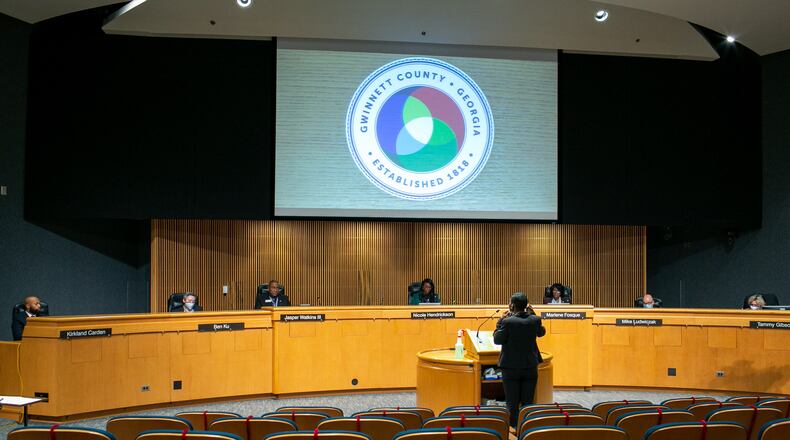The Georgia House and Senate passed a bill Wednesday that could prevent current or future tax commissioners in Gwinnett and Fulton counties from charging cities a special tax collection fee to double or even triple their salaries.
Under Senate Bill 201, negotiations for property tax collection contracts with cities would move out of the hands of tax commissioners and into the hands of county commissioners. It now awaits Gov. Brian Kemp’s signature to become law.
The bill’s passage comes as a relief for Gwinnett County officials and city leaders, who criticized Gwinnett Tax Commissioner Tiffany P. Porter’s recent plan to charge eight cities $2 per parcel to boost her own salary, in additional to normal tax collection fees.
Porter began negotiating contracts with Gwinnett’s city leaders this year, shortly after winning office last November. If implemented, the deals would increase her $140,000 annual salary by more than $110,000 and make her the highest paid elected county official in Gwinnett.
Gwinnett Commissioner Kirkland Carden, who has been highly critical of the additional fees, told The Atlanta Journal-Constitution Thursday that he doesn’t think a majority of the county commission would agree to boost Porter’s salary with the fees if the bill becomes law.
Carden applauded the bill, saying it would prevent tax commissioners from using “their public office for personal gain.” But the commissioner added that general fees charged to cities to collect property taxes could go up modestly. City officials acknowledge they have underpaid the county for the tax collection service in the past.
“We’re going to have to sit down and look at the old rates and try to find a modern rate that the municipalities can live with that’s good for their financial health but also make sure the county is being compensated for the work we’re doing,” Carden said.
Porter declined to comment on passage of the bill Thursday, but said in an emailed statement that she will “continue to serve and fulfill my duties.” She has previously defended collection of the additional fees by questioning the “morality of additional responsibility without additional compensation.”
“To be clear, servicing the cities isn’t just printing some extra lines on a bill; it’s that plus creating individual calculations, databases, records, reports, plus audits and other special assessments and fees that are unique to each city,” Porter has said previously.
Lawrenceville Mayor David Still said he supports the bill, adding he didn’t agree to pay a county official’s salary when he was first elected to city office. Officials with other cities have previously criticized Porter’s proposed fees, which were outlined in contracts city officials would either have had to sign, or find a way to collect their own taxes.
Snellville City Manager Butch Sanders previously said the additional fees would more than triple the cost of tax collection for his city.
Gwinnett’s former tax commissioner, Richard Steele, did not supplement his salary with additional tax collection fees from cities.
“My personal opinion is that I’m already adequately compensated by my salary. It’s the work of the office that has to be done because it takes this entire office to do the job,” Steele told The Atlanta Journal-Constitution in 2019, in reference to other tax commissioners who engage in the practice.
Senate Bill 201 also targets Fulton County, as the bill only applies to counties with at least 14 cities within its boundaries.
Fulton County Tax Commissioner Arthur Ferdinand, who has grown his compensation from $70,000 in 1997 to roughly 500,000 today, likely wouldn’t be impacted by the law.
The Atlanta Journal-Constitution has previously reported cities in Fulton have signed 50-year contracts with the tax commissioner’s office, and the new law likely would not be applied to existing contracts. But the contracts appear to cease once Ferdinand leaves office, according to a 2019 agreement with Johns Creeks obtained by the AJC. That means the Fulton County Commission would negotiate contracts on behalf of Ferdinand’s replacement.
Fulton Commissioner Lee Morris said the first time he spared with Ferdinand over these per-parcel fees was back in the 1990s, when Morris headed the finance committee for the Atlanta City Council.
“I don’t think it’s good public policy,” he said. “It was an anachronism back when Georgia tax commissioners had to go knock on doors to collect taxes.
“It isn’t the tax commissioner who has any additional work to do, it’s the staff,” he said.
Fellow Republican Fulton Commissioner Bob Ellis agrees. “I find it offensive that the guy or gal is taking extra compensation,” he said. " … They’re not really taking on an extra job.”
He added that Ferdinand has been using county resources to do the job all these years, anyway.
Both commissioners said they believed that existing contracts will remain valid until Ferdinand leaves office.
“Once the agreements are struck, they sit until a new tax commissioner takes office,” Ellis said.
Senate Bill 201 received bipartisan support from Gwinnett and Fulton legislators, passing the Georgia Senate Wednesday night with a vote of 47-0. It passed the Georgia House earlier in the day by a 112-55 margin.
“Tax commissioners shouldn’t be able to raise taxes simply to increase their own pay,” said state Rep. Chuck Efstration (R-Dacula), who recommended to the House Rules Committee that the language clamping down on the practice be added to the original bill. “This measure, with bipartisan support, makes clear that tax commissioners are responsible to do their jobs, and the county commissions determine what their pay should be.”
Kemp still needs to sign the bill before it becomes law. The governor’s office declined to comment on the bill Thursday, but a spokeswoman said it should land on his desk in the next week or so.
The Latest
Featured






